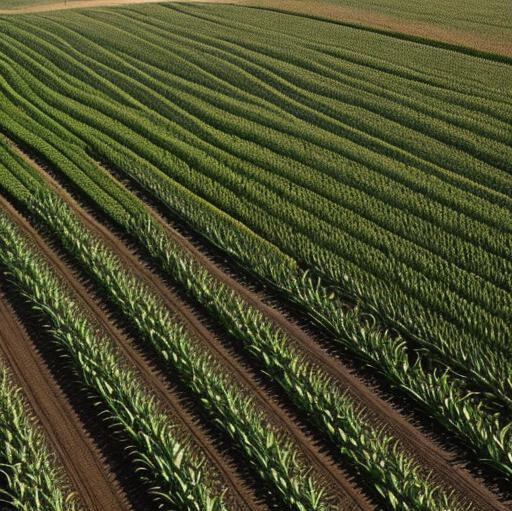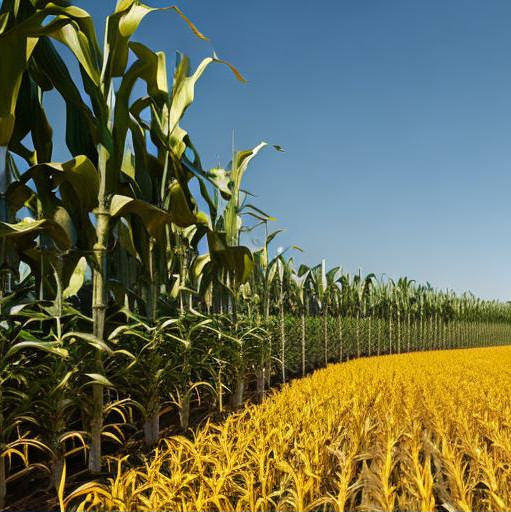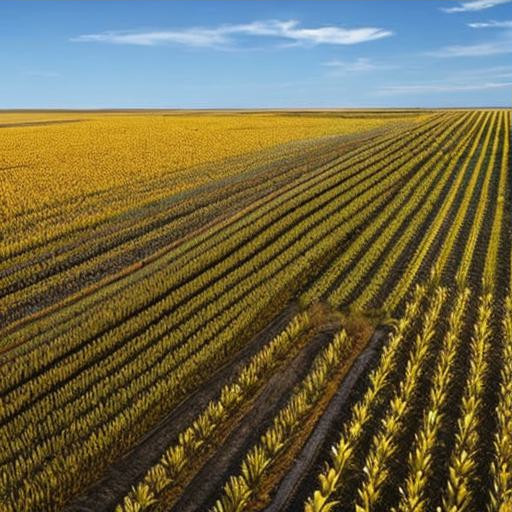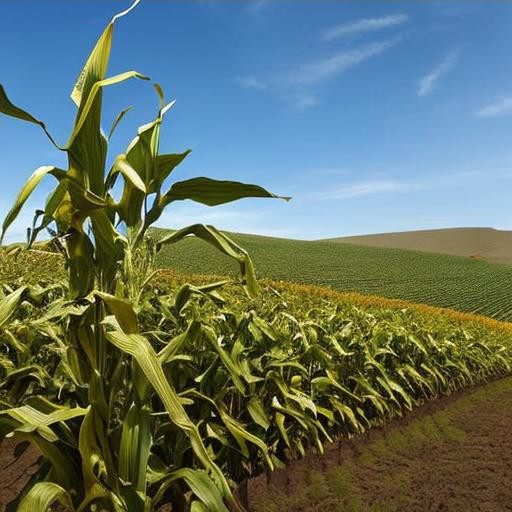Corn Farming Industry
Corn farming refers to the cultivation of maize or corn, which is a staple food crop grown for its kernels. Corn is grown in many parts of the world and is used for a variety of purposes, including animal feed, biofuel production, and as an ingredient in many food products. Corn farming typically involves planting seeds in rows, providing adequate water and nutrients, controlling pests and weeds, and harvesting the mature ears of corn. Modern corn farming often involves the use of advanced technologies such as precision agriculture, genetic engineering, and irrigation systems to increase yields and improve efficiency.
Corn farming is a major agricultural industry in the United States, with the country being one of the largest producers of corn in the world. Corn is grown in many states, but the largest corn-producing states are Iowa, Illinois, Nebraska, Minnesota, and Indiana. In the US, corn is primarily used as animal feed and as an ingredient in various food and industrial products, such as ethanol and high-fructose corn syrup.
Corn farming in the US typically involves large-scale, commercial operations that use modern agricultural practices and technology to increase yields and efficiency. This includes the use of genetically modified seeds, precision agriculture techniques, and efficient irrigation systems. Additionally, farmers in the US often receive government subsidies and support to help maintain a stable and competitive corn industry.
Despite its significance, corn farming in the US faces various challenges, such as changes in global market demand, trade tensions, and the impact of climate change on crop yields. To address these challenges, many corn farmers are exploring alternative growing methods, such as conservation tillage and the use of cover crops, to improve soil health and reduce their carbon footprint.
Types of insureance recomended for corn farming
As a business owner in the corn farming industry, there are several types of insurance you should consider purchasing to protect your operation and assets. These include:
- Crop insurance: This type of insurance provides financial protection against losses due to crop damage or failure caused by events such as weather conditions, pests, and disease.
- Liability insurance: Liability insurance protects you from legal claims made against your business for property damage, personal injury, or other types of liability.
- Equipment insurance: This type of insurance covers the cost of repairing or replacing your farming equipment if it is damaged, lost, or stolen.
- Property insurance: Property insurance protects your buildings, structures, and other assets on your farm from damage or loss due to events such as fire, theft, or natural disasters.
- Workers' compensation insurance: If you have employees, workers' compensation insurance is required in most states and provides benefits to employees who are injured or become ill as a result of their job duties.
It is important to assess your specific needs and risks as a corn farmer, and to work with an insurance agent or broker who has experience in the agriculture industry to determine the right coverage options for your business.

1. Crop Insurance
Crop insurance can provide financial protection for a business owner in the corn farming industry by compensating for losses due to unexpected events that can damage or destroy their crops. For example:
- Suppose a corn farmer has a large crop of corn ready for harvest, but a severe storm comes through and damages the majority of the crop, causing a significant loss of potential income. With crop insurance in place, the farmer can receive compensation for the value of the lost crop, which can help mitigate the financial impact of the loss.
- Another scenario could be a farmer suffering from a crop disease outbreak, causing significant damage to their corn crop. In this case, the farmer can use the compensation provided by their crop insurance policy to pay for the costs of treating the disease and replanting the affected fields.
- In the case of drought, if the farmer has a drought insurance policy, they can receive compensation for their lost crop and the impact it has on their business, helping to offset the financial loss from the reduced yield.
In these scenarios, crop insurance can help provide a safety net for the business owner and help mitigate the financial impact of unexpected events that can harm their crops and income.
2. Liability Insurance
Liability insurance can help a business owner in the corn farming industry by providing protection against legal claims made against the business for property damage, personal injury, or other types of liability. For example:
- Suppose a visitor to the corn farm slips and falls on the property, causing them to become injured. Without liability insurance, the business owner may be held legally responsible for the visitor's medical expenses and other related costs. With liability insurance in place, the policy can cover these expenses and protect the business owner from financial loss.
- Another example could be a situation where a corn farmer's equipment damages a neighboring property during a field operation. Without liability insurance, the business owner could be held liable for the cost of repairing the damage to the neighboring property. With liability insurance, the policy can cover the cost of the repairs, helping to protect the business owner from financial loss.
- In another scenario, if the business owner is sued for alleged breach of contract or other business-related liability, liability insurance can provide coverage for legal defense costs, as well as any settlements or judgments that may result from the lawsuit.
In these scenarios, liability insurance can help protect the business owner from financial loss and provide peace of mind by covering the costs of legal claims and potential settlements or judgments.
3. Equipment Insurance
Equipment insurance can help a business owner in the corn farming industry by providing coverage for the cost of repairing or replacing farming equipment that is damaged, lost, or stolen. For example:
- Suppose a corn farmer's combine harvester is damaged during a harvest operation, causing significant mechanical issues. Without equipment insurance, the farmer would need to pay the entire cost of repairing the combine harvester out of their own pocket, which can be a significant financial burden. With equipment insurance in place, the policy can cover the cost of repairs, helping to protect the business owner from financial loss.
- Another example could be a situation where a corn farmer's tractor is stolen from the field. Without equipment insurance, the business owner would have to bear the entire cost of replacing the stolen tractor. With equipment insurance, the policy can cover the cost of replacing the stolen equipment, helping to protect the business owner from financial loss.
- In the event of a natural disaster such as a tornado or hurricane, equipment insurance can provide coverage for the cost of repairing or replacing damaged equipment, which can help mitigate the financial impact of the disaster on the business owner.
In these scenarios, equipment insurance can help protect the business owner from financial loss and provide peace of mind by covering the cost of repairing or replacing damaged, lost, or stolen equipment.
4. Property Insurance
Property insurance can help a business owner in the corn farming industry by providing coverage for the cost of repairing or replacing buildings, structures, and other assets on the farm that are damaged or lost due to events such as fire, theft, or natural disasters. For example:
- Suppose a fire breaks out in the farm's storage barn, causing significant damage to the structure and the equipment and supplies stored inside. Without property insurance, the business owner would have to pay the entire cost of repairing the barn and replacing the damaged equipment and supplies out of their own pocket. With property insurance in place, the policy can cover the cost of repairs and replacement, helping to protect the business owner from financial loss.
- Another example could be a situation where the farm's grain silo is damaged during a severe storm. Without property insurance, the business owner would have to pay the entire cost of repairing the silo out of their own pocket. With property insurance, the policy can cover the cost of repairing the damaged structure, helping to protect the business owner from financial loss.
- In the event of theft, property insurance can provide coverage for the cost of replacing stolen assets such as tools and equipment.
In these scenarios, property insurance can help protect the business owner from financial loss and provide peace of mind by covering the cost of repairing or replacing damaged or lost assets.
5. Workers' compensation
Workers' compensation insurance can help a business owner in the corn farming industry by providing coverage for the cost of medical treatment, lost wages, and other expenses related to work-related injuries or illnesses sustained by employees. For example:
- Suppose a corn farmer's employee is injured while operating a piece of farming equipment. Without workers' compensation insurance, the business owner would be responsible for paying the entire cost of the employee's medical treatment and lost wages, which can be a significant financial burden. With workers' compensation insurance in place, the policy can cover the cost of the employee's medical treatment and lost wages, helping to protect the business owner from financial loss.
- Another example could be an employee who develops an illness as a result of working in a dusty or chemical-laden environment on the farm. Without workers' compensation insurance, the business owner would be responsible for paying the entire cost of the employee's medical treatment and lost wages. With workers' compensation insurance, the policy can cover the cost of the employee's medical treatment and lost wages, helping to protect the business owner from financial loss.
In these scenarios, workers' compensation insurance can help protect the business owner from financial loss and provide peace of mind by covering the cost of medical treatment and lost wages for employees who are injured or become ill as a result of their work on the farm. Additionally, workers' compensation insurance can help to ensure that employees receive the medical treatment and support they need to recover from their injuries or illnesses and return to work.

Limits and Deductibles
Insurance limits and deductibles are two important concepts in insurance that can impact the cost and coverage of policies for businesses in the corn farming industry.
Insurance limits refer to the maximum amount of coverage that an insurance policy provides for a specific event or set of events. For example, a property insurance policy might have a limit of $500,000 for coverage of buildings and structures, meaning that the policy would cover up to $500,000 in damages or losses from a single event. If damages from an event exceed the policy limit, the business owner would be responsible for paying the difference out of their own pocket.
Deductibles refer to the amount of money that the business owner must pay out of pocket before the insurance policy kicks in and begins covering the cost of damages or losses. For example, if a property insurance policy has a deductible of $5,000, the business owner would be responsible for paying the first $5,000 of damages or losses from an event, and the insurance policy would cover the remaining costs.
In the corn farming industry, both insurance limits and deductibles can impact the cost and coverage of policies. Higher insurance limits and lower deductibles typically result in higher insurance premiums, while lower insurance limits and higher deductibles can help keep insurance costs down. When selecting insurance policies, it is important for business owners to carefully consider their insurance needs, risk tolerance, and budget in order to find the right balance between coverage and cost.
Equipment Insurance vs Property Insurance
Equipment insurance and property insurance are both types of insurance policies that provide coverage for assets on a farm, but they differ in their scope of coverage.
Equipment insurance typically covers the cost of repairing or replacing farming equipment that is damaged, lost, or stolen. This includes tractors, harvesters, and other large pieces of farming equipment, as well as smaller tools and implements. Equipment insurance is designed to protect a business owner's investment in their farming equipment and help ensure that their operations can continue even if equipment is damaged or lost.
Property insurance, on the other hand, provides coverage for the cost of repairing or replacing buildings, structures, and other assets on the farm that are damaged or lost due to events such as fire, theft, or natural disasters. This includes barns, grain silos, and other farm buildings, as well as other structures and assets such as fences and irrigation systems. Property insurance is designed to protect the physical assets of the farm and ensure that the business owner can continue to operate their farm even if their property is damaged or destroyed.
In summary, equipment insurance covers the cost of repairing or replacing farming equipment, while property insurance covers the cost of repairing or replacing buildings, structures, and other assets on the farm. Both types of insurance are important for protecting a business owner's investment in their farm and helping to ensure the continued success of their operations.

Is Insurance always necessary?
In the corn farming industry, some businesses may have a relatively low level of risk and may not require insurance coverage. For example:
- Small-scale corn farming: A small-scale corn farmer who grows corn on a small plot of land and sells it directly to local consumers may have low levels of liability and low levels of risk to their crops and equipment. This type of business may not require insurance coverage, especially if the business owner is comfortable assuming the financial risk in the event of losses.
- Crop-sharing arrangements: A business owner who engages in crop-sharing arrangements with other farmers, where each party provides inputs (e.g. land, seed, labor) and shares in the costs and profits of the crop, may have low levels of risk and liability as the costs and profits are shared among the parties involved. This type of business may not require insurance coverage.
It is important to note that even low-risk businesses in the corn farming industry can benefit from purchasing insurance coverage, as it can provide peace of mind and financial protection in the event of unexpected events or losses. Additionally, some low-risk businesses may be required to purchase insurance coverage as a condition of doing business with certain customers or suppliers. As a result, it is always recommended to carefully assess the specific risks and liabilities of a business and consult with an insurance professional before making a decision about whether or not to purchase insurance.
State Regulations
The insurance requirements and state regulations for corn farming in the United States can vary depending on the specific state and type of farming operation. In general, corn farmers are required to carry liability insurance to protect against claims of property damage or bodily injury that may arise from their farming activities. Some states may also require workers' compensation insurance for employees, or specific types of insurance coverage such as crop insurance.
Here are a few examples of state regulations for the corn farming industry:
- Illinois: Corn farmers in Illinois are required to carry liability insurance to protect against claims of property damage or bodily injury. The state also requires workers' compensation insurance for employees.
- Iowa: Corn farmers in Iowa are required to carry liability insurance to protect against claims of property damage or bodily injury. The state also requires workers' compensation insurance for employees.
- Nebraska: Corn farmers in Nebraska are required to carry liability insurance to protect against claims of property damage or bodily injury. The state also requires workers' compensation insurance for employees.
It is important to note that these requirements are subject to change, and corn farmers should consult with an insurance professional or the relevant state agricultural agencies for the most up-to-date information on insurance requirements and state regulations for corn farming. Additionally, corn farmers should consider the specific risks and liabilities associated with their farming operations when selecting insurance coverage, and consult with an insurance professional to ensure that their insurance coverage meets their needs.

Exclusions
The exclusions in insurance policies can vary depending on the type of insurance and the specific policy. However, here are a few common exclusions in the insurance policies relevant to the corn farming industry:
- Crop insurance: Some common exclusions in crop insurance policies include damage caused by disease, pests, or failure to properly maintain the crops. Crop insurance may also exclude losses due to drought, flood, or other natural disasters, unless the policy specifically covers such risks. Check the policy very carefully.
- Liability insurance: Common exclusions in liability insurance policies include damage caused by intentional acts, criminal acts, or the use of illegal substances. Liability insurance may also exclude claims arising from the sale of products, unless the policy specifically covers product liability.
- Equipment insurance: Common exclusions in equipment insurance policies include damage caused by normal wear and tear, lack of proper maintenance, or operator error. Equipment insurance may also exclude losses due to theft or theft attempts, unless the policy specifically covers these risks.
- Property insurance: Common exclusions in property insurance policies include damage caused by normal wear and tear, flood, earthquake, or war. Property insurance may also exclude losses due to theft or theft attempts, unless the policy specifically covers these risks.
- Workers' compensation insurance: Common exclusions in workers' compensation insurance policies include injuries or illnesses that are intentionally self-inflicted, injuries or illnesses that are caused by the use of illegal substances, or injuries or illnesses that are not directly related to the employee's job duties.
It is important to carefully review the exclusions in insurance policies to ensure that the policy provides the necessary coverage for the specific risks and liabilities associated with the corn farming business. Additionally, corn farmers should consult with an insurance professional to ensure that their insurance coverage meets their needs and to help navigate the complexities of insurance exclusions.

Executive Summary
In summary, insurance is an important consideration for corn farmers in the United States to protect against various risks and liabilities associated with their farming operations. Liability insurance is typically required to protect against claims of property damage or bodily injury, while workers' compensation insurance may be required for employees. Crop insurance, equipment insurance, and property insurance can also be important for protecting against specific risks such as crop damage, equipment damage, or property damage.
However, it is important to carefully review the exclusions in insurance policies to ensure that the policy provides the necessary coverage for the specific risks and liabilities associated with the corn farming business. Additionally, corn farmers should consult with an insurance professional to ensure that their insurance coverage meets their needs and to help navigate the complexities of insurance requirements and exclusions.
Last Update: January 2023






